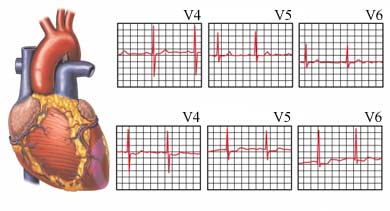Chemical stress test
Description of chemical stress test
Stress test is used, To make sure, that the heart muscle is able to obtain a sufficient amount of blood, when the heart rate and blood flow increases. To do this, the heart must be examined first in a period of rest, and again in a period of increased activity.
The chemical stress test uses chemical agents, which are introduced into the body through a vein. These substances increase the heart activity, as if the heart is under stress.
There are many different ways to explore the heart during a stress test. The heart can be examined using the following methods:
- Stress echocardiography;
- MRT;
- Nuclear imaging (Nuclear stress test).

When is a chemical stress test?
The chemical stress test is used when a traditional stress test (so-called cardiac stress test) It can not be carried out. The patient will not be able to perform this test, if they have certain medical conditions, such as:
- Chronic Back Pain;
- Arthritis;
- Stroke.
In this case, the test is used for chemical exposure. This test is often used, to help determine the following issues:
- If the patient has heart problems and it causes chest pain;
- If the arteries to the heart have blockages or narrowing (coronary artery disease);
- Determination abnormal heart rhythm;
- Reaction monitoring the heart for treatment or procedure;
- Plan rehabilitation after heart attack.
Possible complications during chemical stress test
Complications are rare, but no procedure does not guarantee the absence of risk. Before, how to perform a chemical stress test, you need to know about possible complications, which may include:
- Breathlessness;
- Chest pain;
- Irregular heartbeat;
- Heart attack (rarely).
Medical personnel will stop the test, If there are complications begin. Also during the procedure, the doctor usually present (usually, cardiologist).
How is a chemical stress test?
Before the procedure
Before a chemical stress test can be assigned to the following tests:
- Inspection;
- The electrocardiogram at rest – test, which detects heart activity by measurement of electrical current through the heart muscle;
- Echocardiogram – test, which uses sound waves (ultrasound), to examine the size, the shape and movement of the heart and the function of its valves;
- Revision of drugs taken.
The day before the test should be discussed with your doctor, how long you can not eat or drink before the procedure. Your doctor may recommend the following:
- Do not eat or drink anything with caffeine for 12-24 hours to test;
- Do not eat or drink anything, except water for four hours before the test;
- Do not smoke for several hours before the test;
- It is necessary to wear comfortable clothes;
- You want to give your doctor a list of medicines taken for test;
- In the presence of diabetes, before the procedure is necessary to check the level of glucose;
- You need to tell the doctor about the availability asthma or chronic obstructive pulmonary disease (COPD).
Describes how the chemical stress test
The patient will lie on the table. An employee of the hospital puts electrodes on the chest. Will be measured blood pressure and ECG at rest. Intravenous catheter (hollow needle and thin tube) will be placed in the hand. The patient is connected to a heart monitor, which will record heart activity. Blood pressure and heart rate are checked often.
A small amount of chemical will be introduced into the body via IV. Depending on the chemical, the heart will beat faster and/or blood vessels near the heart opens wider. ECG can be made.
The test may be terminated prematurely, if you feel tired, there was a pain in the chest, breathing problems, or have symptoms, which indicate heart problems. If significant changes in the ECG will also need to stop testing.
If nuclear research, medical staff enters intravenously slaboradioaktivnyj material. Ranging from thirty to sixty minutes after injection of the solution will be used a special camera or MRI to track the passage of chemicals through the heart.
After the chemical stress test
Blood pressure will be monitored, heart rate, removed ECG, While the heart will not return to normal.
How long does it take to get a chemical stress test?
Usually you want to 3-4 o'clock (can sometimes be conducted within 1-2 days)
Whether it hurts when holding a chemical stress test?
No, pain is not felt during a test. With the introduction of a needle can be felt a slight burning.
Results of the chemical stress test
The doctor may get some results immediately after the procedure. The full study results may take 2-3 day.
Treatment or other procedures may be appointed, if the result were detected following deviations:
- ECG changes, which show a low level of oxygen supply to the heart muscle;
- A significant change in pressure or heart rate changes;
- Appeared chest pain or shortness of breath, especially if it was reflected in the ECG;
- The photographs after the nuclear stress test shows the heart with low blood flow or abnormal heart movement.
Depending on the results obtained, your doctor may recommend additional research or therapies.
Communication with a physician after conducting a chemical stress test
After the procedure, you need to see a doctor, If the following symptoms:
- Chest pain;
- Breathlessness;
- Rapid or irregular heartbeat;
- Dizziness and weakness;
- Any other unusual symptoms or problems.
